Synopsis
Act 1
The two renowned bards, Wolfram von Eschenbach and Walther von der Vogelweide, are given the task to write a poem about the life of St. Elisabeth. When the two bards meet, an argument ensues over the question of how the story of the countess should be told. Walther thinks that the hero makes the story and would rather focus on the legend than the truth, while Wolgram wants to unfold the true story behind the saint.
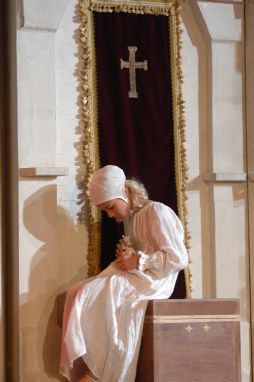 The citizens of Eisenach are waiting in suspense for Elisabeth’s arrival. Elisabeth, the daughter of the King of Hungary, comes to the court of Count Hermann I in Thüringen at the age of four in order for her to grow up in the same family surroundings as her future husband, Ludwig, the heir to the throne. Soon she is driven into social isolation, because she is not accepted as a full member of the count’s family. Only her future husband, Ludwig, and her maid, Guda, can develop a trusting relationship to her in the course of her childhood. Elisabeth increasingly stands up against her feudal class and refuses to take part in the affluent courtly life with its excesses. Due to her firm attitude Elisabeth draws the court’s animosity towards her.
The citizens of Eisenach are waiting in suspense for Elisabeth’s arrival. Elisabeth, the daughter of the King of Hungary, comes to the court of Count Hermann I in Thüringen at the age of four in order for her to grow up in the same family surroundings as her future husband, Ludwig, the heir to the throne. Soon she is driven into social isolation, because she is not accepted as a full member of the count’s family. Only her future husband, Ludwig, and her maid, Guda, can develop a trusting relationship to her in the course of her childhood. Elisabeth increasingly stands up against her feudal class and refuses to take part in the affluent courtly life with its excesses. Due to her firm attitude Elisabeth draws the court’s animosity towards her.
 As a result of being uprooted from her family Elisabeth lacks all trust in human relationships and finds comfort in God instead. She seeks inner peace through prayers and religious rituals. When Count Hermann dies unexpectedly, Ludwig inherits the title and the area of Thüringen. Ludwig sees his father’s untimely death as God’s punishment for his father’s dissolute, unchristian life. At his Count Hermann’s deathbed Ludwig promises God that he will answer for his father’s sins.
As a result of being uprooted from her family Elisabeth lacks all trust in human relationships and finds comfort in God instead. She seeks inner peace through prayers and religious rituals. When Count Hermann dies unexpectedly, Ludwig inherits the title and the area of Thüringen. Ludwig sees his father’s untimely death as God’s punishment for his father’s dissolute, unchristian life. At his Count Hermann’s deathbed Ludwig promises God that he will answer for his father’s sins.
 Contrary to his confidants’ advice, particularly that of his brother and his mother, Sophie, Ludwig marries Elisabeth out of love and affection, however, the court disapproves of this marriage. The learned priest Konrad von Marburg, a preacher and confidant of the Pope, comes to Eisenach and attends on Ludwig and Elisabeth at the Thuringian court. Elisabeth finds a father figure and a kindred spirit in this humble, charismatic person. Elisabeth sees that this priest shares her views and values. Konrad himself is deeply impressed by the fragile, but confident young countess. Konrad proposes that he should become her confessor and spiritual guide. Elisabeth agrees and, in the course of time, Konrad represents a moral and religious ideal for her.
Contrary to his confidants’ advice, particularly that of his brother and his mother, Sophie, Ludwig marries Elisabeth out of love and affection, however, the court disapproves of this marriage. The learned priest Konrad von Marburg, a preacher and confidant of the Pope, comes to Eisenach and attends on Ludwig and Elisabeth at the Thuringian court. Elisabeth finds a father figure and a kindred spirit in this humble, charismatic person. Elisabeth sees that this priest shares her views and values. Konrad himself is deeply impressed by the fragile, but confident young countess. Konrad proposes that he should become her confessor and spiritual guide. Elisabeth agrees and, in the course of time, Konrad represents a moral and religious ideal for her.
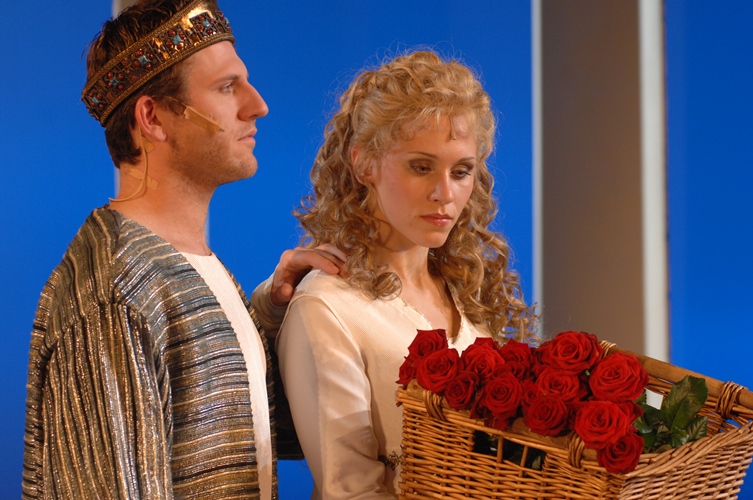
 Ardently Walther tells his version of the legendary "Rose Miracle". Once again the bards have an argument over the question "Miracle or Truth?".
Ardently Walther tells his version of the legendary "Rose Miracle". Once again the bards have an argument over the question "Miracle or Truth?".
 Ludwig leaves Eisenach in order to take part in the fighting caused by a feud over Meißen. Elisabeth has no understanding for this undertaking. Konrad preaches the apocalyptic vision from the Book of Revelation and prophesies "The End of All Time". With these apocalyptic visions he reinforces the fears and guilty feelings of his charge, Elisabeth. Acting as her spiritual guide, he demands absolute obedience from her and she accepts this.
Ludwig leaves Eisenach in order to take part in the fighting caused by a feud over Meißen. Elisabeth has no understanding for this undertaking. Konrad preaches the apocalyptic vision from the Book of Revelation and prophesies "The End of All Time". With these apocalyptic visions he reinforces the fears and guilty feelings of his charge, Elisabeth. Acting as her spiritual guide, he demands absolute obedience from her and she accepts this.
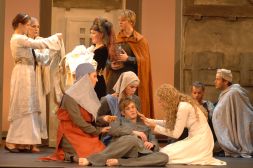 Elisabeth‘ s identification with early Christian values brings her increasingly into conflict with her role as the countess and the resulting difference in standing to the underprivileged and poor. Elisabeth rejects her privileges as a noble and tries, if only symbolically, to surmount the differences in standing. Expensive clothing and decadent banquets are an anathema to her. Elisabeth dedicates her energies to poor and sick instead. During Ludwig’s absence Elisabeth sets up a home for the poor at the foot of the Wartburg.
Elisabeth‘ s identification with early Christian values brings her increasingly into conflict with her role as the countess and the resulting difference in standing to the underprivileged and poor. Elisabeth rejects her privileges as a noble and tries, if only symbolically, to surmount the differences in standing. Expensive clothing and decadent banquets are an anathema to her. Elisabeth dedicates her energies to poor and sick instead. During Ludwig’s absence Elisabeth sets up a home for the poor at the foot of the Wartburg.
 Her behaviour is first received by the court with latent, then with open rejection. Above all Ludwig’s brother feels provoked by Elisabeth and makes no bones about his contempt for her. For Heinrich, Elisabeth is a threat to his manliness and his social standing. Only Sophie, who is initially sceptical, has a certain understanding for her behaviour and attitude.
Her behaviour is first received by the court with latent, then with open rejection. Above all Ludwig’s brother feels provoked by Elisabeth and makes no bones about his contempt for her. For Heinrich, Elisabeth is a threat to his manliness and his social standing. Only Sophie, who is initially sceptical, has a certain understanding for her behaviour and attitude.
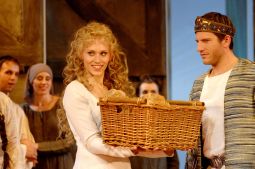 Ludwig returns and Elisabeth spends many happy years at her husband’s side and Hermann, their first child, is born. The immense gratitude that the poor show Elisabeth fills her with a feeling of inner content and deep happiness. Elisabeth feels that she has found her task and her place in the world.
Ludwig returns and Elisabeth spends many happy years at her husband’s side and Hermann, their first child, is born. The immense gratitude that the poor show Elisabeth fills her with a feeling of inner content and deep happiness. Elisabeth feels that she has found her task and her place in the world.
Act 2
 On the insistence of his followers, Ludwig decides to embark on a crusade with Emperor Friedrich II. The decision is mainly influenced by Konrad’s great powers of persuasion, but Konrad motives are purely selfish. When the loving couple, Ludwig and Elisabeth, are on the point of saying goodbye they suddenly become aware that this could be a final farewell. During Ludwig’s absence a great famine occurs in his territory and many people die. Elisabeth takes her own decision to open the count’s granaries and thus saves the lives of thousands of hungry people. Heinrich is furious about Elisabeth’s independent action, but his hands are tied.
On the insistence of his followers, Ludwig decides to embark on a crusade with Emperor Friedrich II. The decision is mainly influenced by Konrad’s great powers of persuasion, but Konrad motives are purely selfish. When the loving couple, Ludwig and Elisabeth, are on the point of saying goodbye they suddenly become aware that this could be a final farewell. During Ludwig’s absence a great famine occurs in his territory and many people die. Elisabeth takes her own decision to open the count’s granaries and thus saves the lives of thousands of hungry people. Heinrich is furious about Elisabeth’s independent action, but his hands are tied.
 Ludwig then dies of a fever on his way to Jerusalem. Elisabeth takes the news of her beloved husband’s death with resigned mourning. Heinrich, who now takes over government business, bans Elisabeth from the Wartburg. Sophie, who is enraged by her son’s behaviour, disowns her son and also leaves the castle in order stand by Elisabeth who is only accompanied by Guda.
Ludwig then dies of a fever on his way to Jerusalem. Elisabeth takes the news of her beloved husband’s death with resigned mourning. Heinrich, who now takes over government business, bans Elisabeth from the Wartburg. Sophie, who is enraged by her son’s behaviour, disowns her son and also leaves the castle in order stand by Elisabeth who is only accompanied by Guda.
 Elisabeth accepts the ban without any resistance, and is, indeed, almost happy about it, as, following her husband’s death, she has withdrawn even further from worldly matters. Elisabeth sees Ludwig’s death as her fate and decides for a life of poverty and devotion. From this time on, she wants to dedicate herself to the poor and ill according to the Christian teachings of neighbourly love. Elisabeth dresses in beggar’s clothes and begs for alms. Once again she comes up against opposition as the people want Elisabeth as a countess, not as a beggar.
Elisabeth accepts the ban without any resistance, and is, indeed, almost happy about it, as, following her husband’s death, she has withdrawn even further from worldly matters. Elisabeth sees Ludwig’s death as her fate and decides for a life of poverty and devotion. From this time on, she wants to dedicate herself to the poor and ill according to the Christian teachings of neighbourly love. Elisabeth dresses in beggar’s clothes and begs for alms. Once again she comes up against opposition as the people want Elisabeth as a countess, not as a beggar.
 Bishop Eckbert from Bamberg, Elisabeth‘s uncle, comes to Eisenach with the intention to persuade Elisabeth to marry Emperor Friedrich. This plan is not without advantages for Eckbert who stands to gain power, influence and wealth through these family ties. However, Elisabeth rejects the offer.
Bishop Eckbert from Bamberg, Elisabeth‘s uncle, comes to Eisenach with the intention to persuade Elisabeth to marry Emperor Friedrich. This plan is not without advantages for Eckbert who stands to gain power, influence and wealth through these family ties. However, Elisabeth rejects the offer.
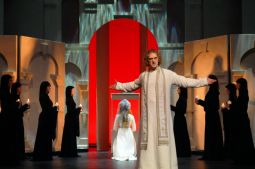 Konrad uses Elisabeth’s her devotedness and willingness to suffer in order to attain yet more power over her. Konrad sees himself as chosen by God to fulfil God’s will, believing that he must lead Elisabeth to sainthood by all means. Konrad ordains severe acts of penance for her and gains increasing power over all areas of Elisabeth’s life. Konrad negotiates a widow’s allowance for Elisabeth with Heinrich and promises to take her to his home city, Marburg. Elisabeth lets herself be persuaded by Konrad to leave her small children in the care of Heinrich and follows Konrad to Marburg where she builds a hospital which she finances with money from her widow’s allowance.
Konrad uses Elisabeth’s her devotedness and willingness to suffer in order to attain yet more power over her. Konrad sees himself as chosen by God to fulfil God’s will, believing that he must lead Elisabeth to sainthood by all means. Konrad ordains severe acts of penance for her and gains increasing power over all areas of Elisabeth’s life. Konrad negotiates a widow’s allowance for Elisabeth with Heinrich and promises to take her to his home city, Marburg. Elisabeth lets herself be persuaded by Konrad to leave her small children in the care of Heinrich and follows Konrad to Marburg where she builds a hospital which she finances with money from her widow’s allowance.
 Elisabeth looks after the sick with great commitment, seeing herself in the suffering of these people, and finds the spiritual peace she longs for through her charitable works. It is only through caring for the sick, lepers and orphans that Elisabeth finds a sense in her life. Within a very short time she distributes almost all her possessions and even goes against Konrad’s will who has ordered her to restrict her alms-giving.
Elisabeth looks after the sick with great commitment, seeing herself in the suffering of these people, and finds the spiritual peace she longs for through her charitable works. It is only through caring for the sick, lepers and orphans that Elisabeth finds a sense in her life. Within a very short time she distributes almost all her possessions and even goes against Konrad’s will who has ordered her to restrict her alms-giving.
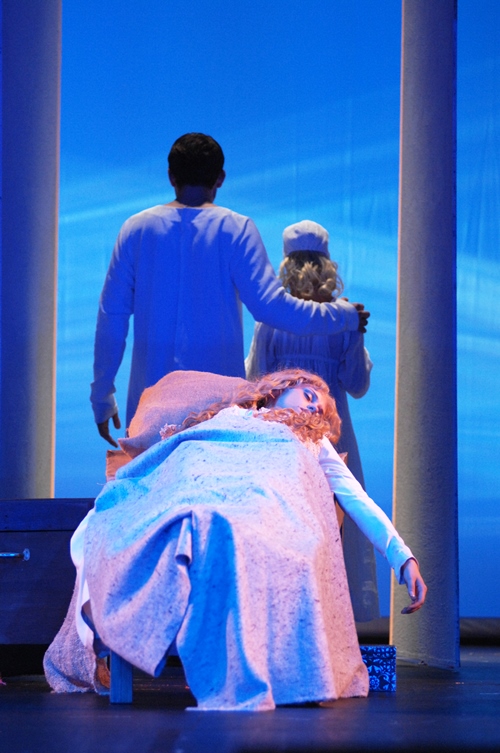
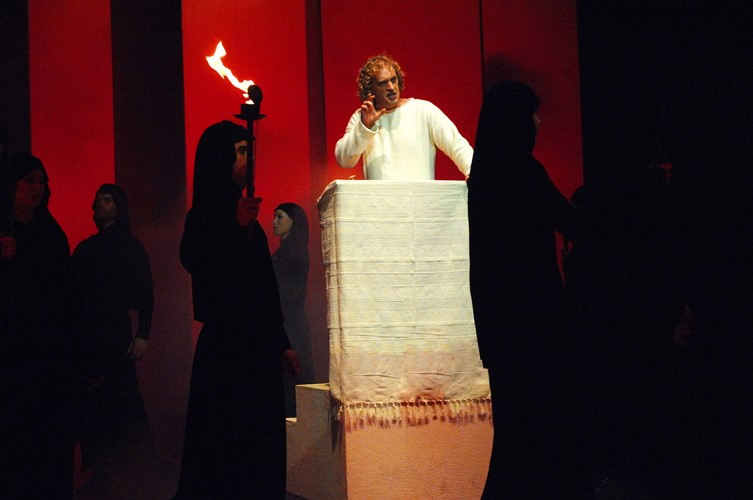 The Pope appoints Konrad as the first German Grand Inquisitor and Konrad gains a name for cruelty due to the persecution of heretics, executions and burnings. Konrad puts all of the self-hate and pain, which has been released in him by Elisabeth’s death, into his inhuman judgements. Finally he becomes insane. Konrad accuses the Count of Sayn of heresy and claims that he is praying to a frog the size of an oven and wants to put him to the stake, but he underestimates the count’s influence and his vassals get revenge by murdering him.
The Pope appoints Konrad as the first German Grand Inquisitor and Konrad gains a name for cruelty due to the persecution of heretics, executions and burnings. Konrad puts all of the self-hate and pain, which has been released in him by Elisabeth’s death, into his inhuman judgements. Finally he becomes insane. Konrad accuses the Count of Sayn of heresy and claims that he is praying to a frog the size of an oven and wants to put him to the stake, but he underestimates the count’s influence and his vassals get revenge by murdering him.
 Walther and Wolfram enter again and surprisingly come to the same opinion: they decide that the Rose Miracle should happen again….
Walther and Wolfram enter again and surprisingly come to the same opinion: they decide that the Rose Miracle should happen again….


